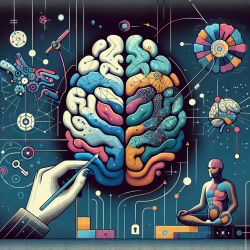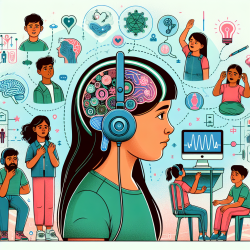As a practitioner working with children and adolescents on the autism spectrum, understanding the complexities of emotion regulation is crucial. Recent research titled "Neural systems for cognitive reappraisal in children and adolescents with autism spectrum disorder" offers valuable insights into how these young individuals process emotions differently from their typically developing peers. This blog post will delve into the study's findings and explore how you can apply these insights to improve therapeutic outcomes.
The Importance of Cognitive Reappraisal
Cognitive reappraisal is a powerful emotion regulation strategy that involves changing one's interpretation of a situation to alter its emotional impact. For individuals with autism spectrum disorder (ASD), who often struggle with emotion dysregulation, mastering this skill can significantly enhance their social interactions and overall well-being.
Key Findings from the Study
The study employed functional magnetic resonance imaging (fMRI) to examine the neural mechanisms underlying cognitive reappraisal in youth with ASD compared to typically developing (TD) peers. Participants were instructed to use cognitive reappraisal strategies while viewing disgusting images. Here are some key findings:
- Amygdala Activity: Unlike TD participants who showed downregulation of amygdala activity during emotion regulation tasks, those with ASD exhibited atypical patterns, including upregulation of left amygdala activity.
- Insula Modulation: TD participants demonstrated decreased insula activity during downregulation trials, whereas ASD participants showed no modulation in these regions.
- Functional Connectivity: The study found altered functional connectivity between the amygdala and prefrontal cortex (PFC) in ASD participants, suggesting potential targets for therapeutic interventions.
Implications for Practitioners
The findings highlight several areas where practitioners can focus their efforts to improve emotional regulation in children with ASD:
- Cognitive Behavioral Therapy (CBT): Incorporate cognitive reappraisal techniques into CBT sessions. Training children with ASD to reinterpret emotional stimuli can enhance their ability to manage emotions effectively.
- Tailored Interventions: Consider interventions that target specific neural pathways identified in the study, such as enhancing amygdala-PFC connectivity through neurofeedback or other innovative therapies.
- Acknowledging Individual Differences: Recognize that children with ASD may require different approaches compared to their TD peers. Tailor strategies to each child's unique neural and behavioral profile.
The Path Forward: Encouraging Further Research
This study opens new avenues for understanding and treating emotion dysregulation in ASD. As practitioners, staying informed about ongoing research is vital. Encourage collaboration between clinical practice and research to develop evidence-based interventions that address the specific needs of individuals with ASD.
If you're interested in exploring this topic further, consider conducting or participating in studies that investigate other emotional states or therapeutic modalities. The field of developmental cognitive neuroscience is rapidly evolving, and your contributions could lead to groundbreaking advancements.
Neural systems for cognitive reappraisal in children and adolescents with autism spectrum disorder










